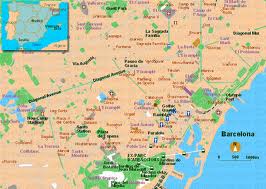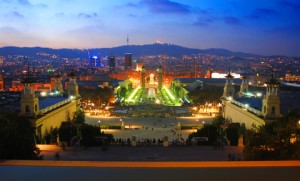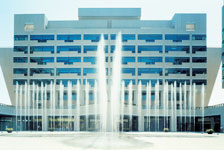
[Updated Oct 2020] A guide to serviced offices and office space in Barcelona as well as general information that may be useful if you are thinking of renting office space in the city.
For further offices information or to search office space for rent in Barcelona database just click. Or contact us for any other query.
History & Geography
Barcelona is not only the second-largest city in Spain but arguably the most beautiful and most visited in Europe. The Catalan capital lies on the northeast coast of the Iberian Peninsula on the Mediterranean. Surrounding the city is the Collserola mountain range and to the southwest lies the Llobregat River. Barcelona was founded by the Carthaginian leader Hamilcar Barca, the father of the legendary general Hannibal, and the city bears his name to this day. The Romans turned Barcelona into a military camp, but due to its beautiful location and excellent harbour, the encampment grew into a thriving city in its own right. Roman grid-style planning can still be seen in the layout of the old Gothic Quarter today, and some Roman ruins are still visible near the city’s museum. After the fall of Rome, the city changed hands several times from the fifth to the eighth centuries, first being occupied by the Visigoths, then the Arabs and finally the Franks. Charlemagne himself created the title Count of Barcelona to rule the city and surrounding regions. As Barcelona increased in power and wealth it became more and more independent, and its sphere of influence expanded to include Aragon and other cities on the Mediterranean like Sicily and Athens. In the 15th century, however, the balance of power shifted to Madrid and trade with the Americas superseded the Mediterranean trade which made Barcelona rich. In the 17th century, Catalonia revolted against Spain resulting in Barcelona being besieged and eventually captured and put under Spanish sway once again. The Napoleonic Wars further ravaged the city and the surrounding area in the 18th century. Barcelona experienced a resurgence however and a fortress was built at Montjuic, where the French astronomer Pierre Francois Mechain invented the meter measurement. During the Spanish Civil War in the 1930s Barcelona fought against Franco, and following his victory was savagely suppressed. The Catalan language and traditions were banned. Despite this following WWII many immigrants flocked to the city, sparking industrialization and modernization. In 1992 Barcelona successfully hosted the Olympic Games, which bolstered the city and region. Today Barcelona is one of the most influential and prosperous cities in Europe.
Economy
Barcelona is the capital of one of the richest areas of southern Europe, Catalonia, comprising more than 66 percent of those that reside in the region. Barcelona itself has a GDP of EUR 177 billion. Manufacturing is an important staple of Barcelona’s economy, however, of late, it has been overtaken by the services sector, a trend that has been seen recently in many major European cities. Other industries important to Barcelona are chemicals, logistics, publishing, telecommunications, pharmaceuticals, electronics, printing and information technology. Traditionally the city has also been a centre of the textile industry, and of late has also tried to establish itself as a fashion centre to rival Milan, Paris and London. The city is also a popular destination for trade fairs and international exhibitions. The Fira de Barcelona is the second largest exhibition hall in Europe and the Barcelona World Trade Centre is also a popular location for conventions. As many people that come to Barcelona on business, there are more that flock to the city for pleasure. The tourism industry has become a mainstay of the local economy generating millions in revenue every year.
 Tourism
Tourism
Barcelona is one of the best-loved cities in Europe, visited equally by Europeans and by those from farther abroad. The combination of the city’s ideal climate, stunning architecture and attractive culture makes it truly unique among the major cities of Europe. The centre of the old city in Barcelona must be one of the most picturesque old quarters in existence. Known as the Gothic Quarter, the area boasts a host of medieval buildings which can transport visitors back to Barcelona’s past. The city is also famous for the number of Art Nouveau buildings it has, as well as the Sagrada Familia church, Gaudi’s incomplete masterpiece. The church is a UNESCO World Heritage Site, as are a host of other buildings in Barcelona. Though not as grandiose as the Sagrada Familia the Church of Santa Maria del Mar is also beautiful, as is the Hospital de Sant Pau. Barcelona’s beach is also a major draw and was recently named by National Geographic as the best urban beach in the world. For sports aficionado’s no visit to Barcelona would be complete without seeing the Camp Nou, home to FC Barcelona, perhaps the most famous football team in the world. Barcelona also hosts a number of music festivals every year, the most famous being the Sonar Festival in June and Primavera Sound Festival in late May.
Transport
Barcelona is served by Barcelona El Prat Airport, located approximately 11 miles from the city centre. El Prat mainly services domestic and European destinations but does have some flights to Latin America, Asia and the United States. Barcelona itself has a fairly efficient public transportation system which consists of a tram, bus and metro. Recently the city introduced the Bicing service, offering bikes which can be hired from one of 100 stations scattered throughout the city. Barcelona’s main railway station is the Barcelona-Sants Station which is served by high-speed rail links to most major Spanish and French cities.
 Office space for rent in Barcelona
Office space for rent in Barcelona
The Spanish economy was hit hard by the financial crisis and has yet to recover. The office market in Barcelona is also still suffering as a consequence. Take-up is at the lowest level reported in the last decade and is mainly the result of companies relocating to cheaper space. Barcelona’s vacancy rate is at 12.8 percent and is predicted to rise above 13 percent by the end of 2013. Rents decreased by almost three percent in 2012 in the city centre, so it is definitely a renters market. The Barcelona World Trade Centre is one of the most popular areas in the city to open an office, as are Gran Via and Diagonal Mar, the main business districts in Barcelona.
Our office space search, advisory and acquisition services are FREE, always. Our Barcelona office space brokers and agents are globally regulated by the Royal Institution of Chartered Surveyors (RICS) ensuring the highest standards of commercial property advice and service at all times.
